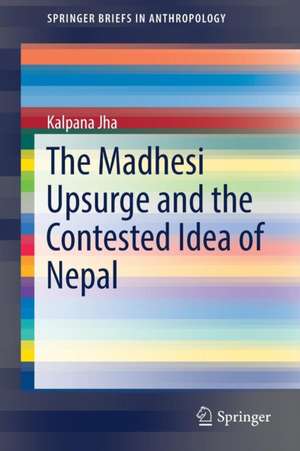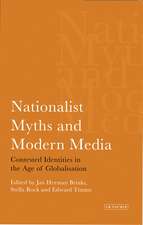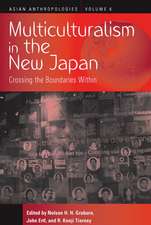The Madhesi Upsurge and the Contested Idea of Nepal: SpringerBriefs in Anthropology
Autor Kalpana Jhaen Limba Engleză Paperback – 27 mar 2017
Preț: 411.93 lei
Nou
Puncte Express: 618
Preț estimativ în valută:
78.82€ • 82.52$ • 65.22£
78.82€ • 82.52$ • 65.22£
Carte tipărită la comandă
Livrare economică 05-19 aprilie
Preluare comenzi: 021 569.72.76
Specificații
ISBN-13: 9789811029257
ISBN-10: 9811029253
Pagini: 111
Ilustrații: XVII, 111 p.
Dimensiuni: 155 x 235 x 7 mm
Greutate: 0.2 kg
Ediția:1st ed. 2017
Editura: Springer Nature Singapore
Colecția Springer
Seria SpringerBriefs in Anthropology
Locul publicării:Singapore, Singapore
ISBN-10: 9811029253
Pagini: 111
Ilustrații: XVII, 111 p.
Dimensiuni: 155 x 235 x 7 mm
Greutate: 0.2 kg
Ediția:1st ed. 2017
Editura: Springer Nature Singapore
Colecția Springer
Seria SpringerBriefs in Anthropology
Locul publicării:Singapore, Singapore
Cuprins
CHAPTER-I History of Nepal amid Contentions: The rise of Madhesi Identity.- CHAPTER-II Ethnic Awakening In South Asia: Drawing Analogy with Nepal.- CHAPTER-III The Construction of Nepali Identity: Onset of Madhes Struggle.- CHAPTER-IV Democratic Innovations, Globalisation and Identity Formation.- CHAPTER-V The Vulnerable Sovereign.- CHAPTER-VI Contemporary Politics: Directions and Dilemma.- CHAPTER-VII End of a Rebellion or beginning of new era of Revolution? Annex-I: Agreements between the Government of Nepal and the agitating Janajatis and Madhesi.- Annex- II: Caste and Ethnic Groups of Nepal.
Notă biografică
Kalpana Jha is a Research Associate at Social Science Baha in Kathmandu, Nepal. She is former research fellow at Tata Institute of Social Sciences, Mumbai. She was also an internal and regional security intern at Institute of Peace and Conflict Studies (IPCS), New Delhi. Her research interests include international relations in South Asia, ethnic and regional conflict as well as democratisation and political transition of weaker states. She is currently working on a book review essay on Pakistan’s political trajectory and democratisation for the Journal of Asian Security and International Affairs (JASIA) and her book review of Parties and Political Change in South Asia (ed. James Chiriyankandath) has been published in the JASIA. She has written several commentaries and op-ed pieces on the Madhesi issue as well as on Indo-Nepal relations.
Textul de pe ultima copertă
This book is set against the burning issue of ethnic uprisings in the Madhes region of Nepal and analyses debates on the idea of contemporary Nepal. The limited view of Nepal as a primarily hill nation with Nepali-speaking people ignores the vast ethnic and linguistic diversity of the country. It has particularly rendered stateless the Madhesi community which inhabits the plains bordering India and shares closer cultural affinity and marital ties across the border. Increasing demands for ethnic and territorial autonomy by the Madhesis suggest the need for redefining the idea of Nepal and establishing Madhesi identity as Nepali identity while at the same time addressing the deeply contested idea of regional versus social identity in the region. This book uses narratives from the Madhesi community including from prominent Madhesi analysts and activists, to define their identity as well as their aspirations in a democratic Nepal. It also provides a perspective on the internal dynamicsof caste and language of this region and their possible impact on consolidating ethnic identities in Nepal.
Caracteristici
Meticulously shows the connection between Nepal history and the current ethnic conflict Discusses an important debate on ethnic identity construction in Nepal in the context of nation-building in South Asia Provides a South Asian perspective on identity conflict and inextricably woven geo-political dynamics Includes supplementary material: sn.pub/extras






























